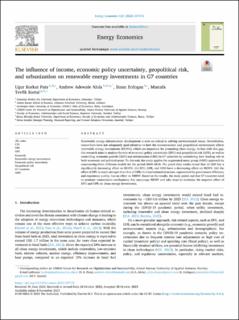The influence of income, economic policy uncertainty, geopolitical risk, and urbanization on renewable energy investments in G7 countries
Peer reviewed, Journal article
Published version
Permanent lenke
https://hdl.handle.net/11250/3126021Utgivelsesdato
2023Metadata
Vis full innførselSamlinger
Sammendrag
Renewable energy infrastructure development is seen as critical to solving environmental issues. Nevertheless, researchers have not adequately paid attention to how the socioeconomic and geopolitical environment affects renewable energy investments (REINV), which are important for promoting clean energy. In line with this gap, this research aims to analyze the role of economic policy uncertainty (EPU) and geopolitical risk (GPR), as well as controlling economic growth (GDP) and urbanization (URB) in G7 countries by considering their leading role in both economic and political areas. To this end, the study applies the augmented mean group (AMG) approach by constructing three different models for the period 2004–2018. The panel data results reveal that (i) GDP has a significantly increasing effect on REINV; (ii) EPU, GPR, and URB have a decreasing effect on REINV; (iii) the effect of EPU is much stronger than that of GPR; (iv) institutional structure, represented by government efficiency and regulatory quality, has no effect on REINV. Based on the results, the study points out that G7 countries need to promote transmission mechanisms that encourage REINV and take steps to minimize the negative effect of EPU and GPR on clean energy investments.

